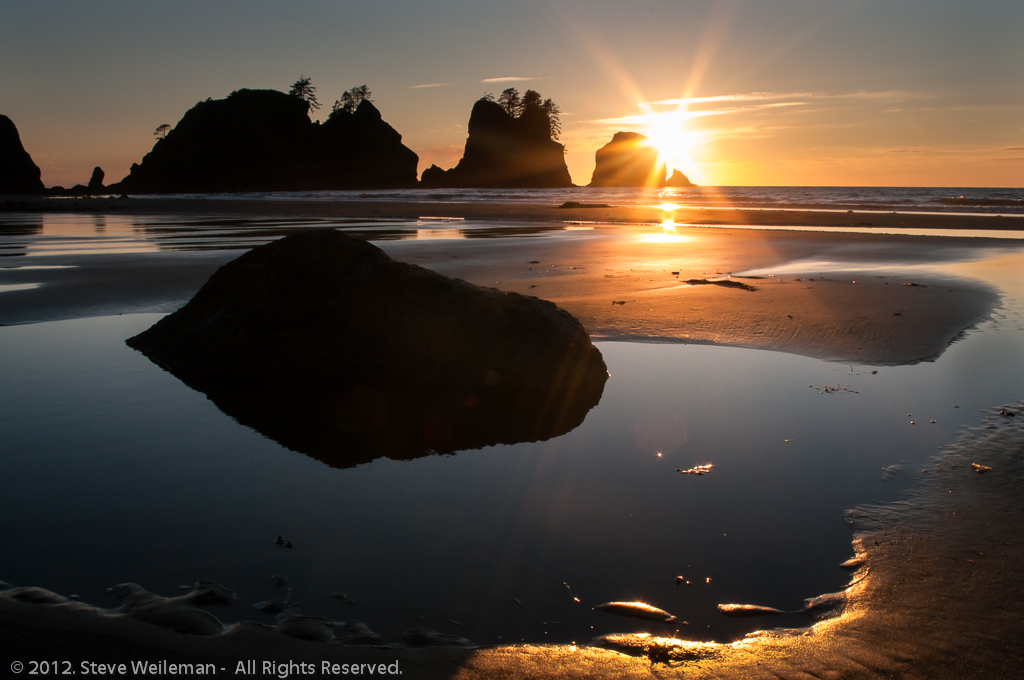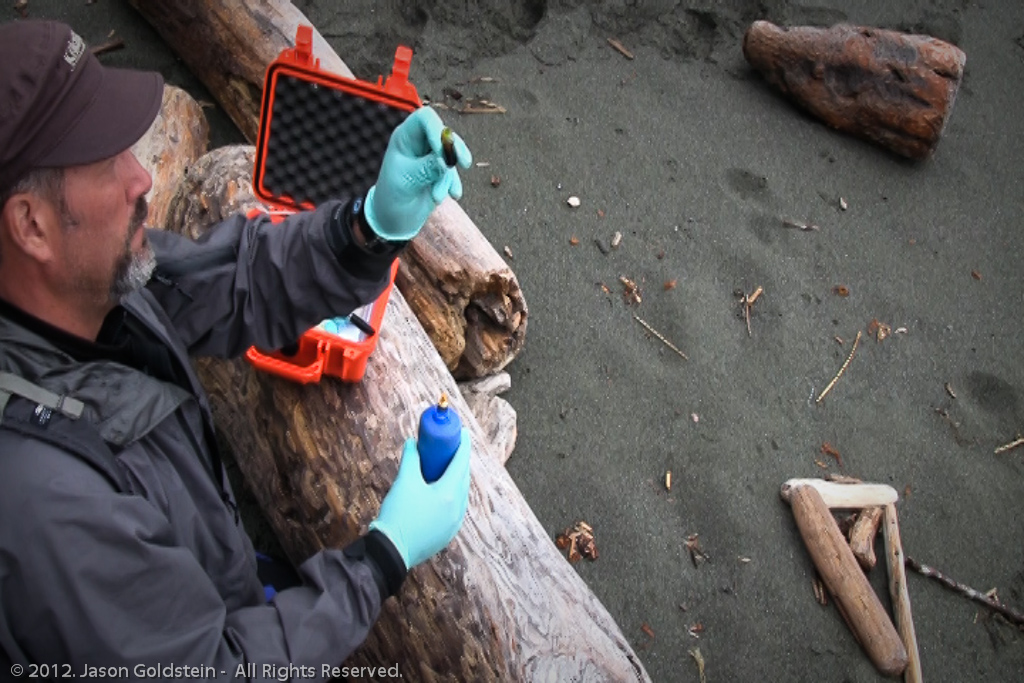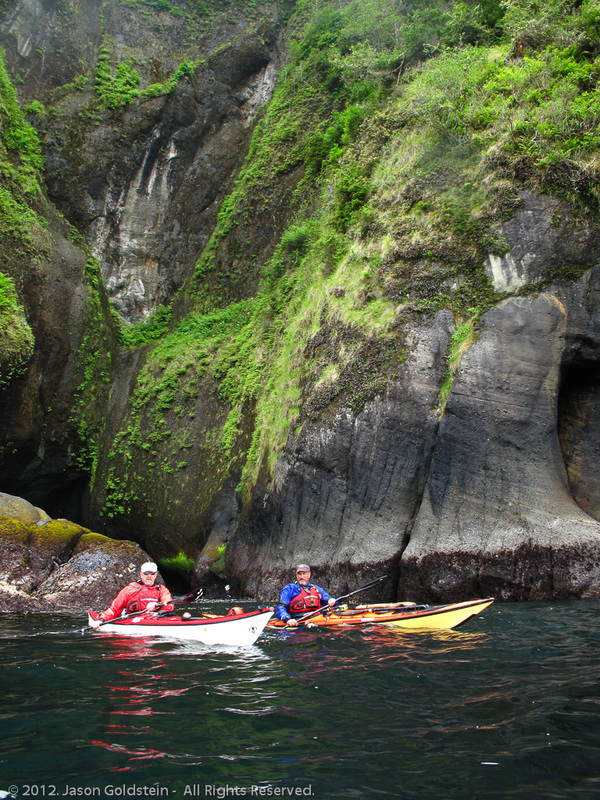Steve Weileman and the Ikkatsu Project seek to understand how Plastic Debris Affects Marine Ecosystems
Ikkatsu is a Japanese word meaning ‘all together, all as one’ representing the notion of cooperative unity, Ikkatsu is also the vision of seasoned adventurers Steve Weileman and Ken Cambell. The Ikkatsu Project, conceived in 2012, was designed to understand the complexities of issues surrounding marine debris, specifically that resulting from the 2011 tsunami that ravaged Japan. Their upcoming expedition will send the team to Alaska’s volcanic Augustine Island to survey its remote beaches for tsunami debris while collecting water samples for ASC.
Weileman and Campbell will depart June 22 and arrive at Augustine Island June 30. The island’s location at the mouth of Cook Inlet puts it in prime position to collect marine debris from the infamous tsunami. Because Augustine Island lacks rivers, no salmon runs mean no bears, which in turn mean no anglers or wildlife viewers. Coupled with the island’s namesake volcano as the most active in the Aleutian Arc, these factors make it one the least-visited islands in North America. Upon surveying Augustine for marine debris, also called flotsam, the team will paddle through harsh open water to Chisik Island and complete the expedition in late July.
Weileman and Campbell will depart June 22 and arrive at Augustine Island June 30. The island’s location at the mouth of Cook Inlet puts it in prime position to collect marine debris from the infamous tsunami. Because Augustine Island lacks rivers, no salmon runs mean no bears, which in turn mean no anglers or wildlife viewers. Coupled with the island’s namesake volcano as the most active in the Aleutian Arc, these factors make it one the least-visited islands in North America. Upon surveying Augustine for marine debris, also called flotsam, the team will paddle through harsh open water to Chisik Island and complete the expedition in late July.
ASC linked theIkkatsu Project with Abby Barrow of the Marine Environmental Research Institute to collect water samples for its microplastic water sampling program. Barrow’s program tests for water quality by identifying microscopic plastic particles that attract toxic chemicals, such as PCBs, and enter the food supply. While pieces of plastic only microns in diameter suspended deep in the ocean might seem a world away from society, those toxins stay in the food chain as organisms eat one another, eventually ending up on our dinner plates.
For Weileman, ASC represents the ideal marriage of adventure and science. “It’s a great organization to work with, what they’re doing is extremely important,” he said. Weileman appreciates ASC’s facilitation of brains and brawn for environmental advocacy. He recognizes his skill set can obtain data that researchers otherwise wouldn’t acquire. “On a personal level it gives me such a great sense of satisfaction because I’m out there doing what I love to do,” he said. “But it’s not just a selfish endeavor, it’s also interesting work. I get to bring some of my skills into the picture.”
For Weileman, ASC represents the ideal marriage of adventure and science. “It’s a great organization to work with, what they’re doing is extremely important,” he said. Weileman appreciates ASC’s facilitation of brains and brawn for environmental advocacy. He recognizes his skill set can obtain data that researchers otherwise wouldn’t acquire. “On a personal level it gives me such a great sense of satisfaction because I’m out there doing what I love to do,” he said. “But it’s not just a selfish endeavor, it’s also interesting work. I get to bring some of my skills into the picture.”
According to Weileman, Ikkatsu’s concept of unity is illustrated by the drifting tsunami debris. “Although this event happened across the largest ocean, it was effecting all of us,” he said. “Instead of the oceans separating us, they really bring us together. It’s a global effect that is felt by everyone.” The project’s tagline, ‘empirical kayaking and wild science,’ embodies the energy and vision of Ikkatsu. With 25 years of professional guiding experience between Weileman and Campbell, the team brings a wealth of knowledge to the table. The two became friends throughout their tenure as guides, at one time running their own outfitter.
The Ikkatsu Project will also submit its data to NOAA in an effort to improve management decisions. Weileman said he hopes the findings will be used to map debris and influence how organizations budget cleanup funds. For Weileman, the crux of the problem becomes the aged cliché – it’s sink or swim. One of the Ikkatsu Project’s main goals is to raise awareness of the issues underlying the flotsam pandemic. “The ocean is ground zero for everything that goes on,” he said. “It’s our source of life, it drives the weather. There may be a mid-western farmer who’s never been to the Pacific Ocean, but the effects reach him.” In the past, Weileman said he’s been overwhelmed with the task at hand, but he remains optimistic in a pragmatic fashion. “If we can engineer the problem, why can’t we engineer the solution?” he rhetorically asks those he counters. “Collectively, we can affect a change. We have to believe that.”
– Dylan Jones
The Ikkatsu Project will also submit its data to NOAA in an effort to improve management decisions. Weileman said he hopes the findings will be used to map debris and influence how organizations budget cleanup funds. For Weileman, the crux of the problem becomes the aged cliché – it’s sink or swim. One of the Ikkatsu Project’s main goals is to raise awareness of the issues underlying the flotsam pandemic. “The ocean is ground zero for everything that goes on,” he said. “It’s our source of life, it drives the weather. There may be a mid-western farmer who’s never been to the Pacific Ocean, but the effects reach him.” In the past, Weileman said he’s been overwhelmed with the task at hand, but he remains optimistic in a pragmatic fashion. “If we can engineer the problem, why can’t we engineer the solution?” he rhetorically asks those he counters. “Collectively, we can affect a change. We have to believe that.”
– Dylan Jones



